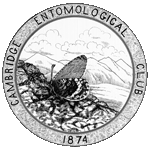
| This is the CEC archive of Psyche through 2000. Psyche is now published by Hindawi Publishing. |
A Note on the Ant Gnamptogenys hartmani Wheeler.
Psyche 68(2-3):69, 1961.
This article at Hindawi Publishing: https://doi.org/10.1155/1961/76084
CEC's scan of this article: http://psyche.entclub.org/pdf/68/68-069.pdf, 68K
This landing page: http://psyche.entclub.org/68/68-069.html
The following unprocessed text is extracted automatically from the PDF file, and is likely to be both incomplete and full of errors. Please consult the PDF file for the complete article.
19611 Brown - Strurnigenys 69
BROWN, W. L., JR.
1953a. Three new ants related to Strunaigenys louisianae Roger. Psyche, 60: 1-5.
1953b. Revisionarv studies in the ant tribe Dacetini. Amer. Midi. Nat., 50: 1-137, if. pp. 28-31.
1959.
The neotropical species of the ant genus Strumigenys Fr. Smith: arouo of emervi Mann (Hymenoptera). Ent. News, 70: 97-104. . -
WILSON, E.O.
1959.
Adaptive shift and dispersal in a tropical ant fauna. Evolution, 13 : 122-144.
A NOTE ON THE ANT GNAMPTOGENYS HARTMAVI
WHEELER. - Workers and winged females of this ant were received recently from Dr. M. R. Smith of the U. S. National Museum and were determined by direct comparison with the type in the Museum of Comparative Zoology. The sample represents a nest taken in the soil of a banana plantation on Zapote Farm, La Lima, Honduras, May 18, 1961
(E. Mblendez leg.). This is the
first record of the species to come to light since the original description, published in 1915, based on a single worker specimen from Huntsville, Texas (C. G. Hartman leg.). The type locality in northeastern Texas has always seemed anon~alous for a genus otherwise confined to a more strictly tropical climate and not known from any other samples occurring natively within the continental United States, but until the present find, the good possibility remained that G. hartmani was an extralimital relict. It now seems more likely that the Texas record represents either a locality error or an adventive specimen taken from bananas. No ecological data accompanied the original find. At least, the occurrence of this (or other) species of G~nampfogenys in Texas remains to be convincingly demonstrated.- W. L. BROWN, JR., DEPARTMENT OF ENTOMOLOGY, CORNELL UNIVERSITY. Psyche 6869 I1961). htlp:ffpsyclK.mlclub.ora/()W68.069 hlml
================================================================================
Volume 68 table of contents